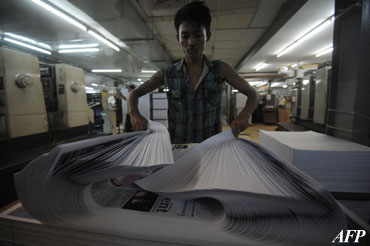Burma should dismantle its censorship department and repeal all laws that continue to allow suppression of news in the name of national security, the Committee to Protect Journalists (CPJ) said on Monday.

The CPJ said it considers the government’s announcement that it will abolish prior censorship a partial measure in addressing the country's restrictive practices.
Tint Swe, the head of the Burmese government's censorship arm, the Press Scrutiny and Registration Division (PSRD), told a group of newspaper editors in Rangoon on Monday that they would be no longer required to submit advance copies of their publications for government review. An announcement was also carried on the PSRD's website.
News journals will now be required to submit copies of their publications to the PSRD after publication.
Authorities had earlier vowed to abolish the PSRD after ending pre-publication censorship, but today's official announcement indicated the censorship body would remain in place and wield the same powers to sanction and suspend publications after the fact for alleged violations of the government's press scrutiny policies and other laws, according to reports by observers of Burma’s media.
The move surprisingly came ahead of the passage of a new media law, which was originally scheduled to be passed by Parliament and come into force by the end of June, but has been repeatedly delayed for unknown reasons. A draft version of the law has not been made public.
“As long as laws that stifle press freedom remain on the books, today's vow to stop pre-censoring the media is a half-measure at best,” said Shawn Crispin, the CPJ senior Southeast Asia representative. “Until the Burmese government undertakes thorough reform, journalists are still at risk of censure and the free flow of information cannot be guaranteed.”
President Thein Sein's government has sent mixed signals in the run-up to the law's highly anticipated passage, including the temporary banning of two news publications recently for running stories without the PSRD's prior approval.
In June, authorities temporarily banned and filed a lawsuit against the local Snapshot news journal for publishing photos of a victim of communal rioting between Muslim and Buddhists groups in the country's Rakhine State.
Local journalists and editors have complained in interviews with exile-run news groups that the yet-unveiled media law was drafted by authorities without input from media members.
A proposed new Press Council, designed to function as a government agency tasked with managing and regulating the media rather than an independent organization dedicated to safeguarding press freedoms, has also come under journalists' criticism, according to the reports.
The CPJ called for the government to repeal restrictive laws including the 1962 Printers and Publishers Registration Act and the 2004 Electronics Act, which it called “vague and draconian legislation” that has been used to jail journalists and curb Internet freedoms.
CPJ ranked Burma 7th on its list of the world's 10 most censored countries in May, noting that the PSRD regularly censors news that could reflect poorly on the military or the government.
The survey also noted that the Burmese government dominates national radio and television, which it consistently deploys to disseminate pro-government and pro-military propaganda.



